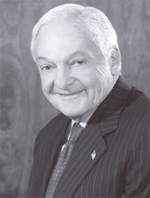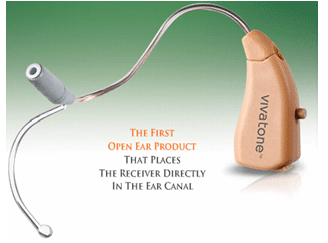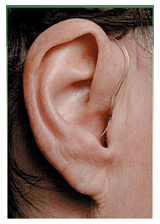Interview with Leon Hirsch, Chariman of Vivatone
Share:
Topic: The Founding of Vivatone
 Dybala: Hello, this is Dr. Paul Dybala with Audiology Online and today I am talking with the Chairman of Vivatone, Mr. Leon Hirsch. Leon, thank you so much for taking time to speak with us today on Audiology Online.
Dybala: Hello, this is Dr. Paul Dybala with Audiology Online and today I am talking with the Chairman of Vivatone, Mr. Leon Hirsch. Leon, thank you so much for taking time to speak with us today on Audiology Online. Hirsch: Good morning.
Dybala: I know you have an interesting background having successfully launched and grown a very successful medical supply company. Could you give us a little history on that?
Hirsch: I founded U.S. Surgical Corporation (www.ussurgical.com). It actually started in my basement back in 1963. We sold it to Tyco in 1998. At that time, it was doing over a billion dollars in sales. So we built it from nothing to a billion dollars.
We invented modern-day surgical stapling. We also created the laparoscopic revolution. Before our laparoscopic inventions, if a patient required gallbladder removal they were in the hospital five or six days, and needed six to seven weeks recovery time. Today, with laparoscopy, gallbladder patients go home the same day, at the latest the next day and get back to work in three or four days.
Dybala: Wow, well that's amazing. So what brought you from surgical staples over to hearing aids with Vivatone?
Hirsch: Lousy hearing.
Dybala: [laughter] I know you helped Vivatone pioneer receiver in the ear technology for hearing aids. Give us a little background on what got you started with that. Was it a personal experience? Was it an experience with a friend or a family member?
Hirsch: It was a personal experience and it led to, what I would consider, the third medical revolution I have been involved in. The first was stapling. The second was laparoscopy and the third is Vivatone.
I have a moderate hearing loss. My family was at the point where they were very tired of "what did you say." So, I went to see an audiologist who had been referred to me by one of the surgeons that I worked with at U.S. Surgical. His name was Dr. Natan Bauman, a former chairman of the Department of Audiology at Yale.
Dr. Bauman tested me and said, "Yes, you do have a moderate hearing loss and we can fix you up," and he fitted me with what in those days, four years ago, was the state-of-the-art in hearing aids. Unquestionably it enhanced my hearing but the occlusion effect was driving me nuts. I would go to a meeting and I would take my hearing aids out because I just couldn't handle the echo chamber effect. On the telephone, like I am now, I had to take my hearing aids out because of feedback. I went back to Dr. Bauman and told him all of this. He said, "All right, let's try another one." We went through three hearing aids and in all honesty, they all did about the same thing.
Bauman said to me, "I have an invention that I believe will cure your problem." I said, "That sounds fabulous. Let me try it," and he said, "Well I don't have it yet. I have it on paper." I said, "Well what are you doing about it?" He said, "We are building a prototype." I said, "As soon as you get the prototype, please call me and let me try it." A month went by and no prototype. I called him and he said "We are working on it." Another month went by, "We're working on it." Finally, I said, "Dr. Bauman, what is the problem here?" He said, "There are two problems. One is we don't have the financing to do it properly and two, I don't know how to build prototypes." I said, "I spent thirty years building prototypes and I have the financial wherewithal to accomplish what you are talking about." We got together and believe it or not, that's how Vivatone was formed.

Vivatone receiver in-the-canal technology
Dybala: It seemed that once Vivatone came out with the receiver in the ear hearing aid, there were other manufacturers that followed with similar technology, could you talk about that?
Hirsch: Well, one of the main reasons that I got involved with Vivatone was I could see the uniqueness of the concept. At the time there was absolutely nobody with a receiver in the ear. There are other features that the receiver in the ear provides such as natural feedback reduction. For example, with a speaker in the ear and microphone behind the ear you have about a four centimeter spread between the two and that breaks the feedback loop. It makes a more efficient way of handing the electronics.

Vivatone hearing aid worn on the ear.
This was a totally unique concept, and we filed our patents and felt fairly well protected. Unfortunately, the U.S. Patent office has not yet issued our patents. We expected our patents to be issued long ago. I guess some of our competitors don't feel very uncomfortable about the patent position; however, our attorneys, who are patent specialists, tell us that we have strong claims in our patent application and that they expect these patents will issue.
Dybala: Now once your patents are issued what are the next steps to approaching the industry, as far as approaching the other manufacturers?
Hirsch: If the patents we have filed and the claims that we have filed issue, we are in the position to say to another manufacturer, "you cannot manufacture the product you are manufacturing." But let's not put the cart before the horse. Let's get them issued and then we will see.
Dybala: What else is happening at Vivatone?
Hirsch: Well, right now we are in the process of expanding our marketing. We started in the United States. Today we market all the way from Taiwan to Denmark and many countries in between. We are expanding our markets everyday. We are also going to be introducing some very exciting new products in 2007. We have a second generation product line in the field. We are going to have some very exciting new things that we will introduce at the 2007 AAA meeting. Vivatone® is going to continue to expand its marketing, continue to expand its product line, and provide better hearing for more people.
Dybala: Well that sounds great. Leon, thank you for taking time out of your very busy day to sit down and talk with us.
I do want to encourage everyone who would like any more information about Vivatone to visit their website (www.vivatone.com), and also on the Vivatone web channel on Audiology Online (www.audiologyonline.com/channels/vivatone.asp). Vivatone has really been moving forward with e-learning courses talking about their product lines. I would encourage all of our readers to also visit that section as well.
With that I am going to close the interview. Again, Leon, thank you much for spending time with me today.
Hirsch: You're quite welcome, Paul. Bye.
